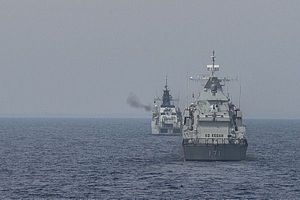A quick glance at the headlines from this year’s Shangri-La Dialogue – Asia’s premier defense summit – would suggest that the proceedings were overwhelmingly dominated by the South China Sea. But to those who attended the meeting, another body of water also featured prominently in the proceedings. Speech after speech, officials highlighted the importance of the Sulu Sea as a key front in confronting Asia’s manifold maritime challenges.
The Sulu Sea – or, more specifically, the one million square kilometer tri-border area in the Sulu-Sulawesi Seas between the southern Philippines, Indonesia and Malaysia – has long been a hub for transnational organized crime and terrorist threats, with its porous borders and weak governance. Following the September 11 attacks, concerns surfaced about Jemaah Islamiyah militants either coalescing around or transiting through the area – concerns that linger with the rise of the Islamic State today. And in 2013, the invasion of Sabah by Filipino militants claiming to be linked to the Sulu sultanate exposed an irritant in Malaysia-Philippine relations and revealed the lingering inter-state tensions that still persist in the area (See: “Malaysia Warns Philippines’ Duterte Against ‘Reigniting’ Sabah Dispute”).
But the development that thrust this front in Asia’s maritime space into the headlines in recent months once again was a spate of kidnappings of Indonesian and Malaysian nationals by the Philippine-based Abu Sayyaf Group. Though these incidents are far from uncommon, they seemed to have reached an inflection point, with the three countries formally agreeing to pursue trilateral patrols on the sidelines of the ASEAN Defense Ministers Meeting (ADMM) in Laos just a week ahead of the Shangri-La Dialogue (See: “Indonesia, Philippines and Malaysia Agree on New Joint Patrols Amid Kidnappings”).
To close observers of Southeast Asian security issues then, it was no surprise that the Sulu Sea played a rather outsized role in both formal and informal discussions at the Shangri-La Dialogue last weekend. Unsurprisingly, in formal proceedings, the states directly involved in the area focused on it the most. During a rather lengthy address at one of the plenary sessions, Indonesian Defense Minister Ryamizard Ryacudu reiterated his country’s concern that if threats were not confronted, the Sulu Sea could become a new Somalia, weakening economic trade and threatening maritime security. Meanwhile, at one of the breakout sessions, Lieutenant General Glorioso Miranda, the acting chief of staff for the Armed Forces of the Philippines, said that managing the maritime border area was one key prong of Manila’s effort to address terrorism and transnational threats.
But other countries chimed in as well, reflecting the fact that this maritime front has implications that extend beyond its immediate stakeholders. Singapore’s Defense Minister Ng Eng Hen described the Sulu Sea patrols as a “welcome initiative” to deal with terrorism and smuggling. Malaysian Defense Minister Hishammuddin Hussein had previously floated an observer role for both Singapore and Thailand in the Sulu Sea patrols since both countries were involved in the successful Malacca Straits Patrols (MSP), which commemorates its tenth year in 2016. In his own address at the Shangri-La Dialogue, Hishammuddin again referenced the MSP as a model for cooperation in the Sulu Sea.
Cooperation in the Sulu Sea also warranted a reference from the United States, reflecting both Washington’s recognition of indigenous subregional efforts as well as its own growing role in assisting countries to work towards them. In his remarks, U.S. Defense Secretary Ash Carter cited the Sulu Sea patrols as an example of regional partners undertaking trilateral efforts of their own in support of what he termed as a “principled security network” (See: “US Hits Right Note at Shangri-La With Principled Security Network”).
Beyond rhetoric, Washington’s own collaboration with regional states is also increasingly factoring in this front. For instance, in the midst of the Shangri-La Dialogue and in between the bilateral phases of the Cooperation Afloat Readiness and Training (CARAT) exercises that Washington does with the Malaysian and Philippine militaries, the U.S., Philippine, and Malaysian navies conducted a coordinated multilateral training activity in the Sulu Sea on June 4. While the United States recognized the importance of the Sulu Sea in regional cooperation even prior the Obama administration, the move reflects the U.S. view that the Sulu Sea is one promising avenue through which Washington can pursue multilateralization with its Southeast Asian partners. That should come as no surprise, considering the fact that apart from assisting ASEAN countries, the United States itself has an interest in tackling challenges like terrorism, piracy, and kidnapping that could directly or indirectly affect its own citizens.
To be sure, it is too early to determine if the Sulu Sea’s prominent role at this year’s Shangri-La Dialogue is merely the product of a reaction to recent events or part of an increasing focus on this front that will sustain into the future. And while developments like multilateral patrols are promising, specifics are being ironed out about their nature (for instance, whether those patrols would be coordinated or joint). Furthermore, the challenge of managing such a porous and ungoverned space with its manifold threats will likely take some time even if multilateral collaboration endures. All the more reason, then, to watch the Sulu Sea as a key front within Asia’s maritime space.






























